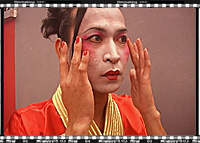The land of eternal paradox, Israel abides all sorts of odd couples. The relationship between Filipino transvestites and elderly religious Jews could well top the list.
Tomer Heymann’s far-ranging and eye-opening documentary, Paper Dolls (Bubot Niyar) lifts the blinds on one of the unusual byproducts of the second intifada. In 2000, in response to the violence, Israel tightened its borders and declined entry to most Palestinian workers.
“Guest workers” were needed to do their thankless, low-paying jobs, such as providing live-in care for elderly Jews. Several Filipino transvestites came to Israel and gravitated to that work.
Heymann’s deeply felt film is, by turns, a portrait of a subculture, a jaunty character study, and a social-issue exposé.
“You can’t get one conclusion about Israel from the movie,” the openly gay Heymann asserted in an interview at his San Francisco hotel last summer. “Usually, it’s very simple. “˜Israel is on the good side.’ Some movies say, “˜No, Israel is bad.’ This movie tries to bring you a few levels, a few colors.”
Paper Dolls raises a host of questions about Israeli’s tolerance of outsiders and its arbitrary immigration polices regarding foreign workers. At the same time, it portrays the shared experiences and friendship that binds strangers in a strange land.
On their one night off a week, the Filipino men get together to perform as glamorous drag queens in a Tel Aviv club as the Paper Dolls. This is their chance not only to be who they are, but to revel in it. It’s bittersweet, however, for the next day they go back to playing the role of caregiver.
“They have to work very hard,” Heymann says. “For me, the strongest thing I took is the daily survival solution they found. They found these few moments of happiness inside of this balagan, inside this crazy moment. They don’t have the privilege to go and fight about their rights, because they have to [concentrate on surviving].”
Paper Dolls continually surprises us, not least with the warmth that develops between a couple of the Filipino men and the aged Jews who depend on them for food, human connection and a regular infusions of vitality.
The film, which Heymann spent endless months editing from 227 hours of footage, follows the Paper Dolls through a number of advances and setbacks. The director’s careful excision of nearly all voices except those of the Dolls gives the documentary an unfiltered directness and emotional punch that is frequently piercing.
“The whole idea of this movie is trying — I hope in the right way — not to see the Paper Dolls above or under, but to give the audience the Paper Dolls’ point of view of Israel,” the 35-year-old Heymann explains. “There’s a lot of movies lately from Israel, but it’s the director or the producer’s point of view. Here, you have 84 minutes about Israel from outside people. You get how they judge the Israeli mentality. You get how they react to the bombs.”
Heymann makes several appearances in the film, notably in a remarkable sequence where one of the Dolls shaves him for a friend’s wedding and, unexpectedly, dresses him and makes him up as a woman.
For filmgoers who don’t identify with transvestites, and who may find the Paper Dolls beyond their experience, Heymann serves as an accessible entry point. But he brings us into the Filipino emigrés’ world so quickly, and so smoothly, that in no time we are caught up in the wrenching ambivalence of their lonely and precarious lives.
Doc offers Filipino transvestites’ view of Israel
